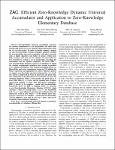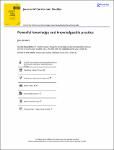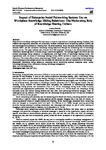Supporting Learning by Tracing Personal Knowledge Formation
| dc.contributor.supervisor | Bleimann, Udo | |
| dc.contributor.author | Thaul, Witold | |
| dc.contributor.other | School of Engineering, Computing and Mathematics | en_US |
| dc.date.accessioned | 2014-05-29T09:36:05Z | |
| dc.date.available | 2014-05-29T09:36:05Z | |
| dc.date.issued | 2014 | |
| dc.identifier | 10165503 | en_US |
| dc.identifier.uri | http://hdl.handle.net/10026.1/3030 | |
| dc.description.abstract |
Internet-based and mobile technologies enable new ways of learning. They offer us new possibilities to access an enormous amount of knowledge at any time and everywhere. Among many advantages, the adaptations require a rethinking of our previous learning behaviour patterns and processes. The challenge for students is no longer to get access to information and knowledge, but to select the right one and to deal with the information and knowledge overflow. The aim of this research is to define, design and validate an advanced concept to support the contemporary learning processes. Therefore, the requirements for a new approach have been assessed, the available solutions from the related area of (personal) Knowledge Management have been investigated, and the weaknesses in the context of learning identified. The identified issues have been substantiated by university students via a quantitative survey. Besides several smaller aspects, knowledge fragmentation and the nescience of the knowledge formation process have been classified as the most critical ones. To overcome these problems, a methodological concept has been developed, and a corresponding technological design created. The chosen approach is an intelligent, independent intermediate layer, which traces the different steps our knowledge entities are going through. Based on personal and individual configurations, the system provides a comprehensive and overall observation of nearly all our knowledge work activities. It supports the building and accessing of the knowledge formation paths for every important knowledge unit, later path combination and the access to automatically generated versions of our work. Moreover, it helps the users not only to remember what they did, but also gives them some strong indications why they did it. This is achieved by combining different knowledge actions and looking at the influences they have on each other. The suggested concept has been critically proved and confirmed via a qualitative expert analysis and backed up by a quantitative survey among university students. | en_US |
| dc.language.iso | en | en_US |
| dc.publisher | Plymouth University | en_US |
| dc.subject | PKM | en_US |
| dc.subject | KM | en_US |
| dc.subject | Personal Knowledge Management | en_US |
| dc.subject | Knowledge Versioning | en_US |
| dc.subject | Knowledge Formation Process | en_US |
| dc.subject | Knowledge Tracing | en_US |
| dc.title | Supporting Learning by Tracing Personal Knowledge Formation | en_US |
| dc.type | Thesis | |
| plymouth.version | Full version | en_US |
| dc.identifier.doi | http://dx.doi.org/10.24382/1536 |
Files in this item
This item appears in the following Collection(s)
-
01 Research Theses Main Collection
Research Theses Main





